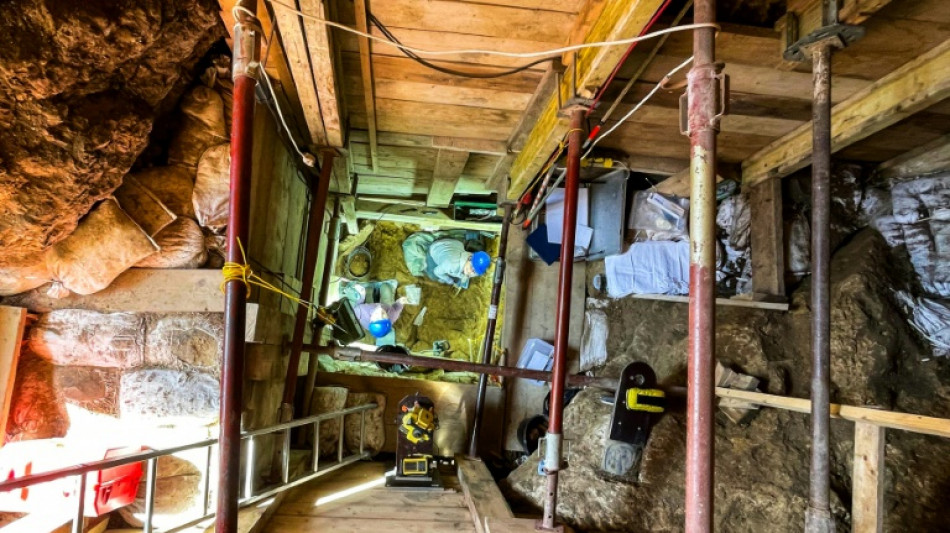
-
 England dig in as they chase a record 435 to keep Ashes alive
England dig in as they chase a record 435 to keep Ashes alive
-
Wembanyama 26-point bench cameo takes Spurs to Hawks win

-
 Hodge edges towards century as West Indies 310-4, trail by 265
Hodge edges towards century as West Indies 310-4, trail by 265
-
US Afghans in limbo after Washington soldier attack

-
 England lose Duckett in chase of record 435 to keep Ashes alive
England lose Duckett in chase of record 435 to keep Ashes alive
-
Australia all out for 349, set England 435 to win 3rd Ashes Test

-
 US strikes over 70 IS targets in Syria after attack on troops
US strikes over 70 IS targets in Syria after attack on troops
-
Australian lifeguards fall silent for Bondi Beach victims

-
 Trump's name added to Kennedy Center facade, a day after change
Trump's name added to Kennedy Center facade, a day after change
-
West Indies 206-2, trail by 369, after Duffy's double strike

-
 US strikes Islamic State group in Syria after deadly attack on troops
US strikes Islamic State group in Syria after deadly attack on troops
-
Epstein files opened: famous faces, many blacked-out pages

-
 Ravens face 'special' Patriots clash as playoffs come into focus
Ravens face 'special' Patriots clash as playoffs come into focus
-
Newly released Epstein files: what we know

-
 Musk wins US court appeal of $56 bn Tesla pay package
Musk wins US court appeal of $56 bn Tesla pay package
-
US judge voids murder conviction in Jam Master Jay killing

-
 Trump doesn't rule out war with Venezuela
Trump doesn't rule out war with Venezuela
-
Haller, Aouar out of AFCON, Zambia coach drama

-
 Nasdaq rallies again while yen falls despite BOJ rate hike
Nasdaq rallies again while yen falls despite BOJ rate hike
-
Bologna win shoot-out with Inter to reach Italian Super Cup final

-
 Brandt and Beier send Dortmund second in Bundesliga
Brandt and Beier send Dortmund second in Bundesliga
-
Trump administration begins release of Epstein files

-
 UN Security Council votes to extend DR Congo mission by one year
UN Security Council votes to extend DR Congo mission by one year
-
Family of Angels pitcher, club settle case over 2019 death

-
 US university killer's mystery motive sought after suicide
US university killer's mystery motive sought after suicide
-
Rubio says won't force deal on Ukraine as Europeans join Miami talks

-
 Burkinabe teen behind viral French 'coup' video has no regrets
Burkinabe teen behind viral French 'coup' video has no regrets
-
Brazil court rejects new Bolsonaro appeal against coup conviction

-
 Three-time Grand Slam winner Wawrinka to retire in 2026
Three-time Grand Slam winner Wawrinka to retire in 2026
-
Man Utd can fight for Premier League title in next few years: Amorim

-
 Pandya blitz powers India to T20 series win over South Africa
Pandya blitz powers India to T20 series win over South Africa
-
Misinformation complicated Brown University shooting probe: police

-
 IMF approves $206 mn aid to Sri Lanka after Cyclone Ditwah
IMF approves $206 mn aid to Sri Lanka after Cyclone Ditwah
-
Stocks advance as markets cheer weak inflation

-
 Emery says rising expectations driving red-hot Villa
Emery says rising expectations driving red-hot Villa
-
Three killed in Taipei metro attacks, suspect dead

-
 Seven Colombian soldiers killed in guerrilla attack: army
Seven Colombian soldiers killed in guerrilla attack: army
-
Amorim takes aim at Man Utd youth stars over 'entitlement'

-
 Mercosur meets in Brazil, EU eyes January 12 trade deal
Mercosur meets in Brazil, EU eyes January 12 trade deal
-
US Fed official says no urgency to cut rates, flags distorted data

-
 Rome to charge visitors for access to Trevi Fountain
Rome to charge visitors for access to Trevi Fountain
-
Spurs 'not a quick fix' for under-fire Frank

-
 Poland president accuses Ukraine of not appreciating war support
Poland president accuses Ukraine of not appreciating war support
-
Stocks advance with focus on central banks, tech

-
 Amorim unfazed by 'Free Mainoo' T-shirt ahead of Villa clash
Amorim unfazed by 'Free Mainoo' T-shirt ahead of Villa clash
-
PSG penalty hero Safonov ended Intercontinental win with broken hand

-
 French court rejects Shein suspension
French court rejects Shein suspension
-
'It's so much fun,' says Vonn as she milks her comeback

-
 Moscow intent on pressing on in Ukraine: Putin
Moscow intent on pressing on in Ukraine: Putin
-
UN declares famine over in Gaza, says 'situation remains critical'


Humans reached icy northern Europe in time of Neanderthals
Pioneering groups of humans braved icy conditions to settle in northern Europe more than 45,000 years ago, a "huge surprise" that means they could have lived there alongside Neanderthals, scientists said Wednesday.
The international team of researchers found human bones and tools hiding behind a massive rock in a German cave, the oldest traces of Homo sapiens ever discovered so far north.
The discovery could rewrite the story of how the species populated Europe -- and how it came to replace the Neanderthals, who mysteriously went extinct just a few thousand years after humans arrived.
When the two co-existed in Europe, there was a "replacement phenomenon" between the Middle Paleolithic and the Upper Paleolithic periods, French paleoanthropologist Jean-Jacques Hublin, who led the new research, told AFP.
Archaeological evidence such as stone tools from both species has been discovered dating from this period -- but determining exactly who created what has proved difficult because of a lack of bones.
Particularly puzzling have been tools from what has been called the "Lincombian-Ranisian-Jerzmanowician" (LRJ) culture found at several sites north of the Alps, including in England and Poland.
One such site near the town of Ranis in central Germany was the focus of three new studies published in the journal Nature.
- Hidden behind a rock -
The cave was partially excavated in the 1930s, but the team hoped to find more clues during digs between 2016 to 2022.
The 1930s excavations had not been able to get past a nearly two-metre (six foot) rock blocking the way. But this time, the scientists managed to remove it by hand.
"We had to descend eight metres (26 feet) underground and board up the walls to protect the excavators," said Hublin of Germany's Max Planck Institute for Evolutionary Anthropology.
They were rewarded with the leaf-shaped stone blades seen at other LRJ sites, as well as thousands of bone fragments.
The team used a new technique called paleoproteomics, which involves extracting proteins from fossils, to determine which bones were from animals and which from humans.
Using radiocarbon dating and DNA analysis, they confirmed that the cave contained the skeletal remains of 13 humans.
That means that the stone tools in the cave -- which were once thought to have been made by Neanderthals -- were in fact crafted by humans as early as 47,500 years ago.
"This came as a huge surprise, as no human fossils were known from the LRJ before, and was a reward for the hard work at the site," said study co-author Marcel Weiss.
The fossils date from around the time when the first Homo sapiens were leaving Africa for Europe and Asia.
"For a long time we have thought of a great wave of Homo sapiens that swept across Europe and rapidly absorbed the Neanderthals towards the end of these transitional cultures around 40,000 years ago," Hublin said.
But the latest discovery suggests that humans populated the continent over repeated smaller excursions -- and earlier than had previously been assumed.
- A cold change -
This means there was even more time for modern humans to have lived side-by-side with their Neanderthal cousins, the last of whom died out in Europe's southwest 40,000 years ago.
This particular group arrived in a northern Europe that was far colder than today, more resembling modern-day Siberia or northern Scandinavia, the researchers said.
They lived in small, mobile groups, only briefly staying in the cave where they ate meat from reindeer, woolly rhinoceros, horses and other animals they caught.
"How did these people from Africa come up with the idea of heading towards such extreme temperatures?" Hublin said.
In any case, the humans proved they had "the technical capacity and adaptability necessary to live in a hostile environment", he added.
It had previously been thought that humans were not able to handle such cold until thousands of years later.
But humans outlasted the Neanderthals, who had long been acclimatised to the cold.
Exactly what happened to the Neanderthals remains a mystery. But some have pointed the finger at humans for driving their extinction, either by violence, spreading disease, or simply by interbreeding with them.
Ch.Kahalev--AMWN


